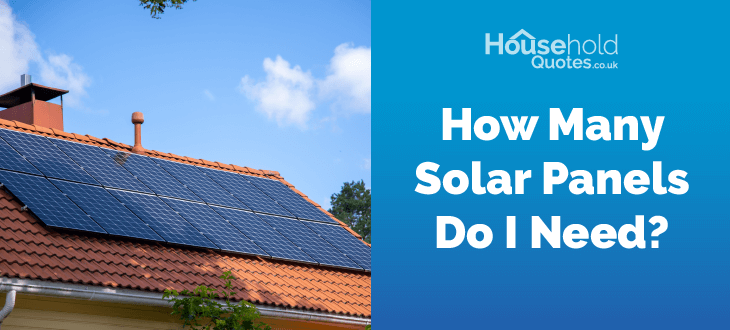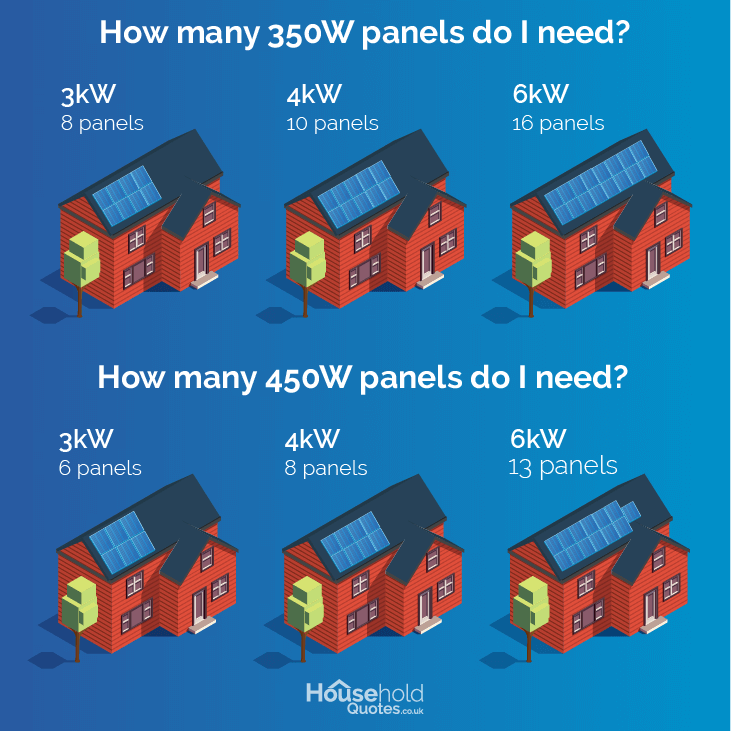
Get up to 4 quotes by filling in only 1 quick form

Compare quotes and find yourself the best deal

Increase the value of your home by installing solar panels
- Householdquotes.co.uk
- Solar Panels
- How Many Solar Panels Do I Need?
How Many Solar Panels Do I Need for My UK Household?


- The average 3-bedroom house in the UK will need 10-13 350W solar panels.
- The number of solar panels you need will depend on your average electricity consumption, the hours of available sunlight in your area, and your rooftop conditions.
- The most popular system size in the UK is a 4kW solar system, which typically suits 3-4 people.
Figuring out exactly how many solar panels you will need for your home can be a tricky business. However, getting this right is important if you are to save the most money with your solar system.
The correct number of solar panels that you’ll need can be determined by a few key factors: your average electricity consumption, the number of sun hours in your area, and your rooftop conditions.
While we do recommend seeking out the advice of a professional installer, this guide can give you an idea of how many solar panels you will need, and get you familiar with the installation process more generally.
Finding a professional installer to make this assessment and carry out your new solar panel installation can be a lengthy process. Rather than taking several hours researching multiple installers online, why not use our simple, free quotes comparison service?
Start by filling in our 30-second form, then we’ll connect you with up to 4 vetted installers in your area. You can then compare their tailored and exclusive quotes to find the best deal possible. Get your free, non-binding quotes by clicking the button below.
- Quotes from local engineers
- Payment by finance available
- Save up to £1005 per year
It only takes 30 seconds



How many solar panels do you need in the UK?
The average 2-3 bedroom home in the UK will require 9x350W panels, or 7x450W panels, to provide their electricity.
You may find that your rooftop is not large enough to accommodate for the correct number of panels. In this case, you might have to invest in a more efficient system that can generate the same amount of electricity with fewer panels. That’s why we’ve provided estimates based on 350W and 450W panels.
The table below shows the estimated number of solar panels per standard-size household in the UK.
| How many 350W solar panels do I need? | ||||
|---|---|---|---|---|
| Household size | Electricity consumption per year | Solar panel system size | 350W panels needed | Required roof space (2m2 panels) |
| 1-2 bedroom | 1,800kWh | 2 – 3 kW | 5 – 8 | 10 – 16m2 |
| 2-3 bedrooms | 2,700kWh | 4 – 5 kW | 10 – 13 | 20 – 26m2 |
| 4-5 bedrooms | 4,100kWh | 6 kW | 16 | 32m2 |
| How many 450W solar panels do I need? | ||||
| Household size | Electricity consumption per year | Solar panel system size | 450W panel needed | Required roof space (2m2 panels) |
| 1-2 bedroom | 1,800kWh | 2 – 3 kW | 4 – 6 | 8m2 |
| 2-3 bedrooms | 2,700kWh | 4 – 5 kW | 8 – 10 | 14m2 |
| 4-5 bedrooms | 4,100kWh | 6 kW | 13 | 20m2 |
Source: Ofgem (Typical annual electricity use (kWh))
- A small home with 1-2 bedrooms will require a 2 -3kW system with 5-8 350W panels, or 4-6 450W panels.
- A medium-sized home with 2-3 bedrooms will require a 4-5kW system with 10-13 350W panels, or 8-10 450W panels.
- A large home with 4-5 bedrooms will require a 6kW system with 16 350W panels, or 13 450W panels.
These figures are estimates based on typical consumption values, provided by Ofgem. The exact number of panels will vary depending on your home’s exact specifications. Like the direction your rooftop faces, and the amount of available sunlight.
The estimates above only apply to traditional solar PV systems, and not solar thermal panels as part of a solar water heating system.
To make full use of the solar power generated from your panels, you can also consider accompanying them with a solar battery. A solar battery that can collect all the solar energy that you don’t use and store it for later use.
Despite a high upfront solar battery cost, it could help reduce the average homeowner’s electricity bill by as much as 70%. Without it, some of the electricity generated by your panels cannot be used, so you may not fully reap the benefits of solar energy.
Calculate the number of solar panels you need
Now for the technical part. The number of panels you need can be determined by multiplying the power output of your solar panels (measured in watts) by the number of hours in which they can absorb sunlight.
So, if we take 350W and multiply it by the average number of sunlight hours in the UK, which was 4.9 hours in 2022 (according to Statista), you’ll see the potential amount of electricity that can be generated per day by a single solar panel.
You can then work out your daily consumption by taking your annual consumption amount, which is about 2,700kWh per year for an average household, and dividing it by 365. Your electricity bill might include your annual consumption already, otherwise, you can take your monthly figure and multiply it by 12.
Then, divide your daily consumption by the daily output of your solar panels to see how many solar panels would be needed to meet your demands, as so:
Solar panel daily output = 350W x 4.9 sunlight hours = 1,715Wh per day
Number of solar panels needed = (2,700kWh / 365 days) = 7.40kW
Convert 7.40 kilowatts into watts
7,400W / 1,715Wh = 4.3 (5 panels)
This calculation assumes that your panels are working in ideal conditions and have the best angle for solar panels in the UK. This would mean that they are south-facing, oriented between 30-40 degrees, and are not shaded by trees or other buildings. In most cases, these conditions cannot be met 100% of the time.
Considering external factors, you can decrease the solar panel output capacity in your calculations for a more generous estimate. As an example, the figures we have provided below have done so by about 50%:
Solar panel daily output (accounting for external environmental factors) = 0.5 x 1,715Wh = 857,5Wh
Number of solar panels needed = 7,400W / 857,5Wh = 8.4 (9 panels)
What size solar system do I need?
The system size that you require mostly depends on your consumption demands, the corresponding number of panels, and the power output of the panels.

Our estimates are based on typical average consumption values, according to Ofgem. However, your own consumption needs might fall somewhere between these estimates. Use the table below to estimate the system size you will need, based on the number of panels you install.
| What size solar system do I need for my 350W panels? | ||
|---|---|---|
| Solar system size | Number of panels | Required roof space (2m2 panels) |
| 1kW | 3 | 6m2 |
| 2kW | 5 | 10m2 |
| 3kW | 8 | 16m2 |
| 4kW | 10 | 20m2 |
| 5kW | 13 | 26m2 |
| 6kW | 16 | 32m2 |
| What size solar system do I need for my 450W panels? | ||
| Solar system size | Number of panels | Required roof space (2m2 panels) |
| 1kW | 2 | 4m2 |
| 2kW | 4 | 8m2 |
| 3kW | 6 | 12m2 |
| 4kW | 8 | 16m2 |
| 5kW | 10 | 20m2 |
| 6kW | 13 | 26m2 |
If you know the number of panels that your home requires, then you can figure out the required system size simply by multiplying this by the solar panel power output, and then converting it to kilowatts. For example:
Multiply the number of panels by the power output = 8 panels x 350W = 2,800W
Convert the total watts into kilowatts = 2,800W / 1000W/kW = 2.8kW
Round up to the nearest .5 = 2.8 → 3kW system
In the end, consumers want to target modules with 25-year warranties from companies that are likely to be around that long. If the consumer’s energy needs are high for their available surface area (roof or ground mounts) then they may need higher power panels, otherwise the power of the panels does not play that large of a role in performance or overall cost.

Joshua M. Pearce is the John M. Thompson Chair in Information Technology and Innovation. He holds appointments at Ivey Business Schooland the Department of Electrical & Computer Engineering at Western University. He runs the Free Appropriate Sustainability Technology research group.
Do bear in mind that the figures we’ve provided throughout this page are estimates meant to guide you and that the conditions in your home may differ from our results. However, we can also help you get the best-tailored advice as to the correct number of panels for your home.
If you’re still wondering “should I get solar panels?”, but you’re not sure where to start, then look no further! To help get hold of the best solar panels in the UK, for the best price, then use our free quotes comparison service to be connected to up to 4 of the top-rated solar installers in your area.
Rather than spending countless hours searching online for installers to work with, let us do the hard work by matching you with the most suitable solar installers for your situation.
All you have to do is fill in our 30-second form. It’s free, fast, and you’re under no obligation to accept any of the quotes you receive.
Get started today by clicking the button below.
- Quotes from local engineers
- Payment by finance available
- Save up to £1005 per year
It only takes 30 seconds



What could affect the number of solar panels I need?
For the most accurate assessment as to the ideal number of solar panels you need, it’s best to consult a professional installer. They can look at your utility bills and your roof and estimate the optimal number of panels appropriate for your house. The installer can also provide full costs and the economic returns you can expect from installing solar panels.
As we’ve mentioned, the number of solar panels you actually need is often determined by various external factors. You may find that the ideal number of solar panels you need will increase or decrease based on how much your home is affected by these factors.
Take a look at some of them below.
Type of solar panels
The type of solar panels you choose is important in determining the efficiency of your solar array. In the UK, solar panels typically convert between 10 and 22% of solar energy into usable electricity.
If your panels have a higher percentage rating, they generate more electricity for your home, reducing energy bills and possibly allowing you to sell excess electricity back to the grid.
The different characteristics of each type of solar panel influence their efficiency levels, cost, and overall performance.
The table below outlines the average efficiency ratings according to each type of solar panel.
| Solar panel efficiency | |
|---|---|
| Type of solar panel | Efficiency |
| Monocrystalline | 15 – 22% |
| Polycrystalline | 15 – 20% |
| Thin-film | 10 – 20% |
Monocrystalline solar panels
Monocrystalline solar panels are the most efficient type of domestic solar panels and can be recognised for their sleek, all-black appearance.
They are made up of layers of single-crystal silicon which electrons can easily pass through, making them highly energy efficient. They also operate well in low-light conditions. Because of these reasons, they are generally priced higher than other types of solar panels.
Polycrystalline solar panels
Polycrystalline solar panels are made by melting multiple silicon crystals into squares. They differ from monocrystalline panels in their crystal silicon structure and blue tone.
These panels are also less efficient because electrons can not move as easily through the internal silicon, which is melted together to form square moulds. They also tend to have a shorter lifespan due to temperature sensitivity. However, polycrystalline panels are more cost-effective and they produce less waste during production.
Thin-Film solar panels
Thin-film solar panels are the most affordable of the three options because they require less materials during their production. They are made by placing thin films of PV materials onto a substrate.
Despite being less space-efficient and having a shorter lifespan, thin-film panels excel in low-light conditions, even generating electricity in bright moonlight. While less energy-efficient, with an efficiency as low as 10% or less, thin-film panels offer flexibility and can be applied in various settings, such as on motorhomes. They also tolerate high temperatures well, making them suitable for warmer climates.
Sunlight hours
In the UK, solar panels receive varying sunlight hours per month. While solar panel output peaks in summer, generating more energy, they still operate effectively in winter.
If your region has limited sunlight, you should consider installing additional panels. A property in northern Scotland may require more panels than one in southern England for similar results.
Solar panels operate exclusively during daylight hours. To ensure power availability at night or during low sunlight periods, you can complement solar panels with grid power or store excess energy in solar batteries for off-grid systems.
Rooftop direction and orientation
Choosing the right direction and orientation for your solar panels is optimal to their efficiency. In the UK, a south-facing roof catches the most sunlight, making it the best choice.
Don’t be deterred though, because solar panels will still operate effectively even if your roof doesn’t face south. If your roof faces east or west, you might need a few extra panels to match the energy production of a south-facing roof. The angle of your roof is also important; the perfect angle to catch the most sunlight is between 30 and 40 degrees as this is perpendicular to the sun for the longest time.
Solar panel costs and savings per system size
In the UK, solar panels will cost between £5,000 – £13,000, excluding on-the-day installation costs. Solar panel costs in the UK depend on the size of the array you need, which is largely based on your average energy consumption.
With a new solar system, it’s possible to drastically reduce your household electricity costs. The power generated during the panels’ operation comes at no cost, potentially leading to yearly savings ranging from £486 – £1,107. The amount you save will depend on how much free solar energy you consume, your location in the UK, and current electricity prices.
| Solar panel costs and savings | ||||
|---|---|---|---|---|
| Household size | Electricity consumption | Solar panel system size (kW) | Solar panel system cost | Potential annual savings |
| 1-2 bedroom | 1,800kWh | 2 – 3kW | £5,000 – £8,000 | £440 |
| 2-3 bedrooms | 2,700kWh | 4 – 5kW | £9,000 – £12,000 | £660 |
| 4-5 bedrooms | 4,100kWh | 6kW | £12,000 – £13,000 | £1,005 |
To learn more about various PV system sizes, check out our dedicated kW pages below:
In the UK, you can also take advantage of solar panel grants such as the Smart Export Guarantee (SEG). With the SEG, you can earn an income for supplying excess solar power generated by your panels back to the national grid. There are currently 13 companies licensed to offer SEG payments in the UK currently. Their tariff rates range from 1p – 20p/kWh.
How to be sure you have the right number of solar PV panels?
While this guide can help you estimate the number of solar panels that you might need for a new solar panel installation, we always recommend that you seek out the professional advice of a trained installer.
They can assess the exact conditions on top of your roof, help you calculate your electricity consumption, and advise you as to the solar panel size, the exact number of panels, and type that you need.
It’s important that you only consult the most top-rated and experienced installers in your area so that you can be sure that they will carry out the job with the utmost quality and attention. This is why it’s always best to compare multiple quotes before agreeing to work with an installer.
It can take a lot of time to get the quotes you need. Some people might spend days searching and still find the best quotes out there. To avoid spending all this time and effort, use Household Quotes’ free quotes comparison tool.
Here’s how it works:
- Fill in the form: it only takes 30 seconds to fill in a few simple details!
- Wait to receive your quotes: we will connect you with up to 4 of the best installers in your area.
- Compare your quotes: with multiple quotes to choose from you can easily find the best deal.
All of the installers have been individually selected and vetted by us. All of our quotes are free and come with no obligations. Get started today by clicking the button below.
- Quotes from local engineers
- Payment by finance available
- Save up to £1005 per year
It only takes 30 seconds



Frequently asked questions
A small home with 1-2 bedrooms will require a 2 -3kW system with 5-8 350W panels, or 4-6 450W panels., a medium-sized home with 2-3 bedrooms will require a 4-5kW system with 10-13 350W panels, or 8-10 450W panels., and a large home with 4-5 bedrooms will require a 6kW system with 16 350W panels, or 13 450W panels.
Calculate the potential daily electricity output of a single panel by multiplying its power output (e.g., 350W) by sunlight hours. Using this, divide your daily consumption (taken from your annual or monthly usage) to estimate the required panels. You should always overestimate to account for less-than-ideal conditions.
For a standard 2-3 bedroom household with an annual electricity consumption of 2,700kWh, between 10-13 350W solar panels is needed.
A large, full house with 4-5 bedrooms will require a 6kW system with either 16 350W panels or 13 450W panels.

Ciaran is a content writer at Household Quotes. He has become an expert in energy saving and eco-conscious living which he uses to create informative content for Household Quotes readers.
